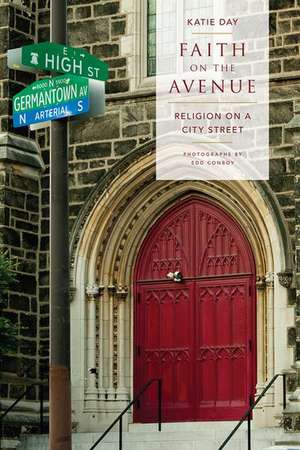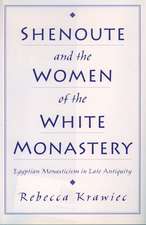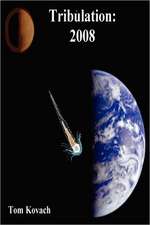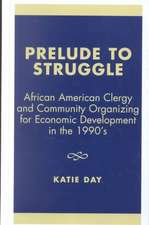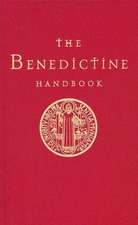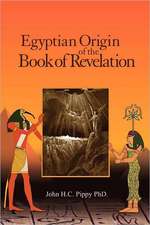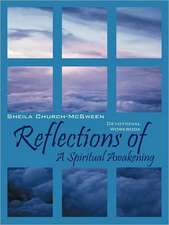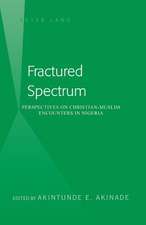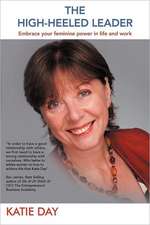Faith on the Avenue: Religion on a City Street
Autor Katie Dayen Limba Engleză Paperback – 26 apr 2018
| Toate formatele și edițiile | Preț | Express |
|---|---|---|
| Paperback (1) | 160.44 lei 10-16 zile | |
| Oxford University Press – 26 apr 2018 | 160.44 lei 10-16 zile | |
| Hardback (1) | 307.65 lei 31-37 zile | |
| Oxford University Press – 23 ian 2014 | 307.65 lei 31-37 zile |
Preț: 160.44 lei
Preț vechi: 173.54 lei
-8% Nou
Puncte Express: 241
Preț estimativ în valută:
30.70€ • 32.16$ • 25.44£
30.70€ • 32.16$ • 25.44£
Carte disponibilă
Livrare economică 07-13 martie
Preluare comenzi: 021 569.72.76
Specificații
ISBN-13: 9780190868369
ISBN-10: 0190868368
Pagini: 266
Ilustrații: 78 photos
Dimensiuni: 231 x 155 x 18 mm
Greutate: 0.39 kg
Editura: Oxford University Press
Colecția OUP USA
Locul publicării:New York, United States
ISBN-10: 0190868368
Pagini: 266
Ilustrații: 78 photos
Dimensiuni: 231 x 155 x 18 mm
Greutate: 0.39 kg
Editura: Oxford University Press
Colecția OUP USA
Locul publicării:New York, United States
Recenzii
This accessibly written book will appeal to researchers, teachers, and students of the sociology of religion and related disciplines."-Sociology of Religion
A well-written and well-argued look into a truly unique religious environment. Highly recommended.
Katie Day has delivered an empirically rich, thoroughly insightful portrait of religious life in Philadelphia's Germantown area. Particularly unique is her ethnographic exploration of the complexities of identity and socialization for Muslims and Latina Pentecostals who share the Avenue. Faith on the Avenue makes a significant contribution to the ecological tradition in the study of urban religion. Elegantly-at times poignantly-written, it will be read for years to come.
Faith on the Avenue situates the varieties of religious communities within the dynamic changes that affect their surrounding communities. It is particularly successful in capturing the struggle to develop and maintain sacred spaces in physical and social environments that frequently generate apathy and rejection from the general public. It engages urban and theological issues, and demonstrates the contributions faith communities make to their members and their neighborhoods.
Since the founding of Germantown in the seventeenth century, the avenue that bears its name has been a center of spirituality and freedom of thought, leading William Penn to call his Pennsylvania colony a 'holy experiment.' That experiment continues today, as Katie Day so brilliantly and vividly portrays in Faith on the Avenue, an insightful and important study of the cultural, demographic, and religious diversity of this historic urban corridor. Whether you know Philadelphia or not, this work is relevant to and valuable in understanding urban America and the critical role that faith and religious identity continue to play in its communities.
These rich portraits put a human face on how the congregations influenced, shaped, and reacted to both local conditions and larger trends, as well as ways congregations empowered, and shaped the agency of their congregants for the various challenges of urban life. Day uses these portraits to segue into ways to assess the impact of urban congregations on the well-being of the social fabric in Philadelphia. This book is recommended for students of urban religion, and those interested in a sophisticated deployment of both social sciences and ethnography.
Day's narrative and methodological approach is sure to benefit anyone seeking to apply an urban ecological lens to the contemporary religious life of Germantown Avenue or other urban centers that have yet to be studied.
A well-written and well-argued look into a truly unique religious environment. Highly recommended.
Katie Day has delivered an empirically rich, thoroughly insightful portrait of religious life in Philadelphia's Germantown area. Particularly unique is her ethnographic exploration of the complexities of identity and socialization for Muslims and Latina Pentecostals who share the Avenue. Faith on the Avenue makes a significant contribution to the ecological tradition in the study of urban religion. Elegantly-at times poignantly-written, it will be read for years to come.
Faith on the Avenue situates the varieties of religious communities within the dynamic changes that affect their surrounding communities. It is particularly successful in capturing the struggle to develop and maintain sacred spaces in physical and social environments that frequently generate apathy and rejection from the general public. It engages urban and theological issues, and demonstrates the contributions faith communities make to their members and their neighborhoods.
Since the founding of Germantown in the seventeenth century, the avenue that bears its name has been a center of spirituality and freedom of thought, leading William Penn to call his Pennsylvania colony a 'holy experiment.' That experiment continues today, as Katie Day so brilliantly and vividly portrays in Faith on the Avenue, an insightful and important study of the cultural, demographic, and religious diversity of this historic urban corridor. Whether you know Philadelphia or not, this work is relevant to and valuable in understanding urban America and the critical role that faith and religious identity continue to play in its communities.
These rich portraits put a human face on how the congregations influenced, shaped, and reacted to both local conditions and larger trends, as well as ways congregations empowered, and shaped the agency of their congregants for the various challenges of urban life. Day uses these portraits to segue into ways to assess the impact of urban congregations on the well-being of the social fabric in Philadelphia. This book is recommended for students of urban religion, and those interested in a sophisticated deployment of both social sciences and ethnography.
Day's narrative and methodological approach is sure to benefit anyone seeking to apply an urban ecological lens to the contemporary religious life of Germantown Avenue or other urban centers that have yet to be studied.
Notă biografică
Katie Day is the Charles A. Schieren Professor of Church and Society at the Lutheran Theological Seminary at Philadelphia. She is the author of three other books and numerous articles that look at how religion impacts a variety of social realities.
